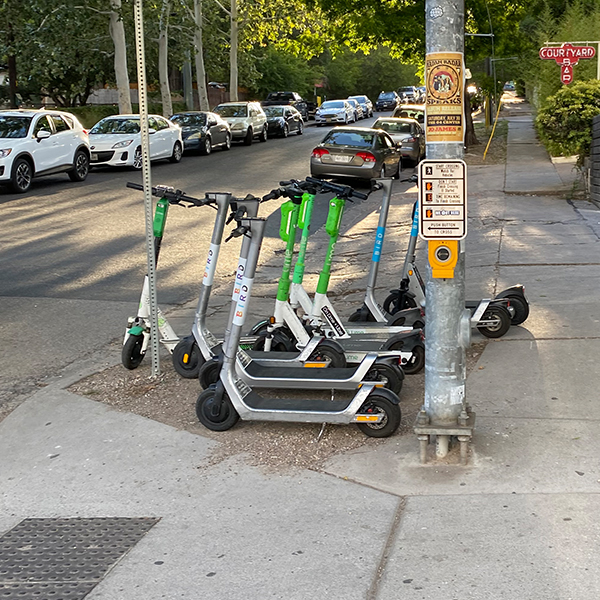
Abstract
While gaining widespread popularity in cities worldwide, electric scooters (e-scooters) have also raised significant safety and other concerns since their emergence in the United States in late 2017. This study addressed these concerns by examining e-scooter safety using multiple data sources. The study utilized data collected from two main sources in Austin, Texas, spanning a period of 4 years (2018 to 2021): hospital emergency room patient records obtained from Dell Seton Medical Center and crash data obtained from Texas Department of Transportation’s Crash Records Information System. Further, field-based micro-level built environment data from the study area as well as macro-level demographic, socioeconomic, and built environment data from publicly available sources was collected. The findings highlighted the importance of improving consistency in incident and injury reporting as well as the development and integration of data from different sources. The exploratory analysis revealed key insights on injured e-scooter riders as well as injury and crash patterns. The findings underscored the importance of targeted safety education, interventions addressing alcohol and drug use, infrastructure planning, and time/location-specific measures to enhance e-scooter safety and reduce incidents. A notable finding pertained to intersections, underscoring the need for improvements in visibility, implementation of traffic calming measures, and provision of education specifically tailored for micromobility riders.
Project Highlights
- This research project aimed to offer a comprehensive exploration of e-scooter safety, utilizing an extensive dataset accumulated over four years within Austin, Texas.
- A multi-level analysis, spanning a period of 4 years (2018 to 2021), was utilized. Supporting data originated primarily from two sources: (1) emergency room patient records from Dell Seton Medical Center in Austin, Texas, and (2) the CRIS data maintained by TxDOT’s Traffic Safety Division.
- The findings underscored the importance of targeted safety education, interventions addressing alcohol and drug use, infrastructure planning (including enhancements to the design of micromobility-friendly intersections in urban areas), improvements in visibility, implementation of traffic calming measures, and time/location-specific measures to enhance e-scooter safety and reduce incidents.
Final Report
EWD & T2 Products
Course Modules: This slide deck incorporates insights from this project for use in graduate courses and seminars such as Traffic Engineering, Engineering and Urban Transportation Systems. This slide deck offers information on various data sources and methodologies relevant to the examination of micro-mobility safety. (Sener, I. N., & Koirala, P. (2023). In-Depth Examination of E-Scooter Safety: A Case Study of Austin, Texas. Project Slide Deck.)
Student Impact Statement(pdf): One students received funding under this project (Pranik Koirala, a Master’s student in Civil and Environmental Engineering at Texas A&M University). This file contains a statement by Pranik Koirala as to the impact this project had on education and workforce development.
Project Brief: Sener, I. N., & Koirala, P. (2023). In-Depth Examination of E-Scooter Safety: A Case Study of Austin, Texas. . Safety Through Disruption (SAFE-D) National UTC. August 2023.
Presentations/Publications
Koirala, P., & Sener, I. N. (2023). Examining E-Scooter Risk Factors: A Multi-Level Exploratory Analysis for Safer Urban Mobility. Presented at the International Professional Association for Transport & Health (IPATH) Annual Meeting 1-Day Conference Series, which was held virtually on Thursday, 29 June 2023.
Koirala, P., Sener, I. N., & Zhang, Y. (2023). Injury Severity Analysis of Imbalanced E-scooter and Bicycle Crash Data Using Statistical and Machine Learning Models. Technical Paper, Under Review.
Koirala, P., Sener, I. N., & Zhang, Y. (2024, January 10). Injury Severity Analysis of Imbalanced E-scooter and Bicycle Crash Data Using Statistical and Machine Learning Models [Poster Presentation]. TRB 103rd Annual Meeting, Washington, DC, United States.
Research Investigators (PI*)
Ipek N. Sener (TTI/TAMU)*
Pranik Koirala
Project Information
Start Date: 2019-08-01
End Date: 2023-08-31
Status: Complete
Grant Number: 69A3551747115
Total Funding: $136,590
Source Organization: Safe-D National UTC
Project Number: TTI-04-02
Safe-D Theme Areas
Big Data Analytics
Transportation as a Service
Safe-D Application Areas
Planning for Safety
Vulnerable Users
More Information
Sponsor Organization
Office of the Assistant Secretary for Research and Technology
University Transportation Centers Program
Department of Transportation
Washington, DC 20590 United States
Performing Organization
Texas A&M University
Texas A&M Transportation Institute
3135 TAMU
College Station, Texas 77843-3135
USA
